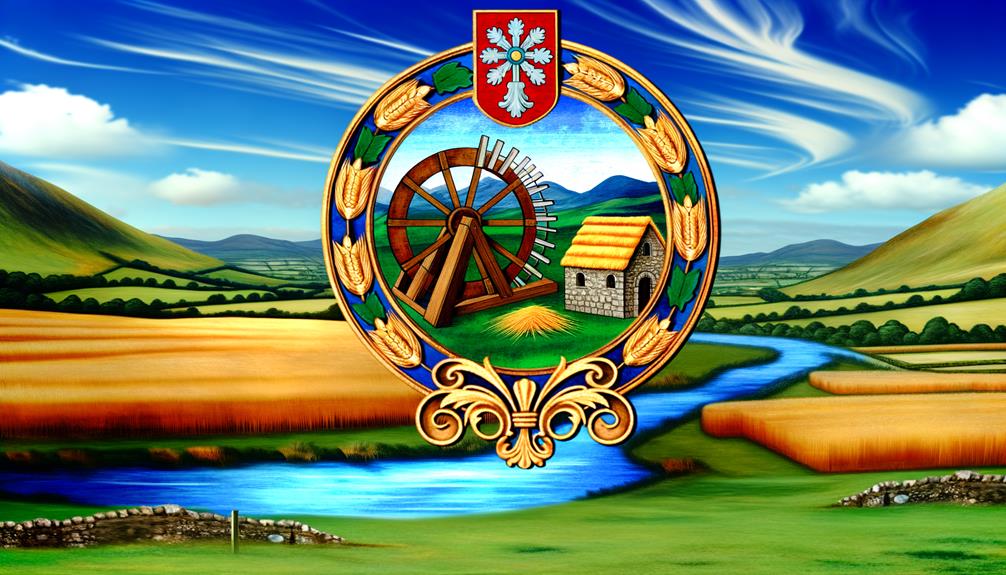Miller Name Meaning and Origin
The surname 'Miller' originates from the Old English term 'mylen' and the Latin word 'molinarius', indicating its roots in the profession of milling. Historically, Millers were pivotal in medieval European society, operating mills to grind grain into flour, contributing significantly to local economies.
The name is widespread in countries such as the UK, Germany, and the US, particularly in regions with rich milling histories. It has a prominent cultural presence, appearing in literature like 'The Canterbury Tales' and modern media.
Today, individuals with the surname Miller continue to influence various fields, from theater to academia. Discover more about their enduring legacy.

Key Takeaways
- The surname 'Miller' originates from the Old English term 'mylen.'
- It is derived from the Latin word 'molinarius,' meaning miller.
- The name historically refers to individuals involved in milling grain.
- 'Miller' is common in regions with a milling history like the UK, Germany, and the US.
- The surname reflects the significant societal role of millers in medieval Europe.
Etymology of 'Miller'
The surname 'Miller' originates from the Old English term 'mylen,' which itself is derived from the Latin word 'molinarius,' meaning 'one who works at a mill.'
This etymological evolution underscores the term's long historical roots, reflecting its integration into the English lexicon during the Middle Ages. The shift from Latin to Old English indicates the significant influence of Roman culture and technology on early English society.
By analyzing historical documents, it becomes evident that the surname 'Miller' was widely adopted across England and later in Scotland, often employed to denote individuals involved in milling grain.
This linguistic journey from Latin to Old English highlights the adaptability and enduring nature of occupational surnames within the socio-economic framework of medieval Europe.
Historical Occupation
Many individuals bearing the surname 'Miller' historically engaged in the occupation of milling, a crucial industry that played a key role in the agrarian economies of medieval Europe.
These millers operated mills, where grains such as wheat, barley, and rye were ground into flour, a staple food product. The process typically involved the use of water or wind power to turn large millstones.
As communities depended on these mills for their daily bread, millers held an essential position in society, often enjoying both economic stability and social respect.
Historical records indicate that this occupation was not only necessary for sustenance but also for local commerce, as millers frequently traded flour and other milled products within and beyond their communities.
Geographical Distribution
Tracing the geographical distribution of the surname 'Miller' reveals its widespread prevalence across various regions, particularly in countries with historical ties to milling industries such as the United Kingdom, Germany, and the United States. In the UK, the surname is notably common in England and Scotland. Germany, particularly in regions like Bavaria and Baden-Württemberg, also shows a significant concentration of Millers. The United States, due to its immigrant influx, has a high frequency of this surname, especially in states like Pennsylvania and Ohio.
| Country | Regions with High Prevalence | Historical Context |
|---|---|---|
| United Kingdom | England, Scotland | Roots in medieval milling |
| Germany | Bavaria, Baden-Württemberg | Historical milling communities |
| United States | Pennsylvania, Ohio | Immigrant influx and settlement |
| Australia | New South Wales, Victoria | British immigration patterns |
| Canada | Ontario, Quebec | European settler heritage |
This distribution underscores the historical and occupational significance of the name.
Cultural Impact
Examining the cultural impact of the surname 'Miller' reveals its deep-rooted presence in literature, media, and societal structures, reflecting the historical significance of the milling profession. Literary references can be traced back to classic texts like Geoffrey Chaucer's 'The Canterbury Tales,' where the Miller is a prominent character.
In modern media, notable figures such as playwright Arthur Miller have left an indelible mark on American culture. The surname also appears in various societal roles, underscoring its widespread adoption.
Key areas of influence include:
- Literature: 'The Canterbury Tales' by Geoffrey Chaucer.
- Media: Contributions of Arthur Miller in American theatre.
- Societal Roles: Frequent use in various professional and community contexts.
Modern Usage
In contemporary society, the surname 'Miller' continues to thrive, prominently featured across various professional domains, from politics and entertainment to academia and business.
Notable individuals include Arthur Miller, a towering figure in American theater, and Dennis Miller, a well-known comedian and political commentator. In academia, Judith Miller has made significant contributions to journalism and media studies. The business world is not devoid of the name either, with figures like former CEO of Kraft Heinz, Bernie Miller, exemplifying leadership. Politically, Stephen Miller has been a significant advisor in recent U.S. administrations.
These examples underscore the versatility and widespread presence of the Miller surname, affirming its enduring relevance and influence in modern times.
Conclusion
The surname 'Miller' epitomizes the quintessential transformation from an occupational necessity to a widespread familial identifier. Historically rooted in the essential trade of grain milling, its proliferation across geographies underscores the universal reliance on this crucial profession.
The cultural resonance of 'Miller' extends into literature and media, symbolizing industriousness. Despite modern detachment from its origin, the name endures, a sign of societal evolution.
Consequently, 'Miller' endures, ironically detached from its humble beginnings yet omnipresent in contemporary nomenclature.






